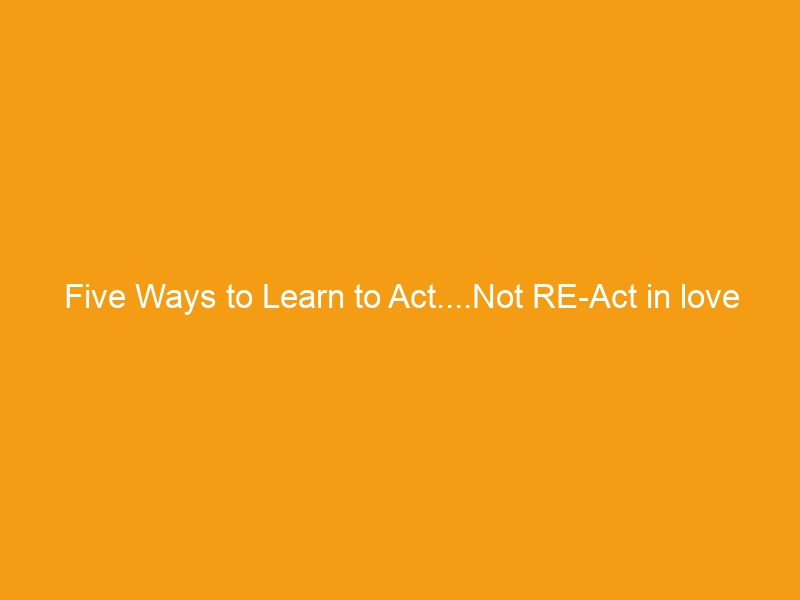
Five Ways to Learn to Act….Not RE-Act in love
Sherrie Campbell, Ph.D.-The Author of Loving Yourself
Why is love so hard? This is a common question. It is emotional reactivity that makes love painful and elusive. When we are emotionally reactive we are acting out of our defenses not our hearts or our truth. We become egotistical and self-protective rather than open and vulnerable. Sadly, emotional reactivity is highly contagious. Once one person gets defensive and inflexible it tends to infuriate the other who ends up doing the same. This only increases the conversation tension between partners. When we lose emotional control we end up disrespecting our partners in the worst and most offensive ways which undermines the trust and sense of accountability in our relationships. The truth cannot come to the surface for discussion because being reactive blocks the true understanding of the information that needs to be discussed and resolved. In essence being reactive serves to prevent lovers from being able to say what they really need and want to say, and thus, solutions are slow to come if they can come at all.
Here are five effective ways to learn to Act and not Re-Act in love.
1). Shift Your Perception of Communication: Change the way you view conflict. The intention behind all conflict is the desire for a solution. Your partner may not be attacking you. They may be trying to help you. Try and see what your partner says as feedback rather than criticism. We can more often see value in feedback and digest it. We tend to be closed minded to criticism. So, be curious rather than judgmental.
2). Do Not Take Things Personally: It is not all about you. When you are defensive by nature, this essentially means you are not open to new information. Defensiveness is a form of hypersensitivity which can come when you think someone is insulting you when they, in reality, are not. All you have to do is be open to new information. It is not that threatening. It is just information for you to think about. Stick to the facts not the emotions. Try and be objective not reactive.
3). Take Your Time to Think Before You Respond: If you are feeling like you need to defend your self-worth try thanking your partner for sharing their thoughts with you, and tell them you would like some time to think about what they had to say and you will talk to them about it when you feel more clear about your thoughts and feelings. In this way you are not agreeing with any new information, yet, you are willing to think about it. Then, think about it. This strategy helps you to pause rather than jump.
4.) Listen: The hardest thing to do for sensitive or defensive people is to listen. This takes discipline and willingness. Sometimes there is more value in saying nothing, rather than saying things you are going to regret. If you feel yourself getting angry, simply stop talking and listen. Your anger will only create pain for you and your partner. Learn to listen rather than debate.
5). Focus on the Bigger Picture: When we Re-Act we are not seeing ourselves on the same team as our partners. We have to remember that we are on the same team. Try and understand where your partner is coming from and see the good in what they are saying because it is there. The intention is to come together. In order to do this, you need to stay calm and try and see the bigger picture. Most reactive people stay focused on small details that do not matter when it comes to the bigger picture. Learn to be collaborative not competitive.
Love can only thrive in mutually beneficial relationships where there is an equal give and take and a mutual back and forth. In order to love and be active in your love relationships you must realize that you do not have to be so emotional all the time. There are ways to be clear without being obnoxious. You have to know yourself well enough to say no when you need to, to be flexible when you need to and to know when to compromise. If you are not clear within yourself you will not be clear in your love relationships. We all desire love and we desire love that works. So, work on yourself by becoming less reactive.
Little life message: There is always something to learn from putting yourself aside to consider the needs of others.

Bio: Dr. Sherrie Campbell is an author and a licensed Psychologist with more than nineteen years of clinical training and experience. She provides practical tools to help people overcome obstacles to self-love and truly achieve an empowered life. Click http://www.sherriecampbellphd.com/relationship-advice-love-creates-the-common-ground-sherrie-campbell-ph-d/ to get her free article on Five Ways to Make Love the Common Ground in Your Communication. She is a featured expert on a variety of national websites and has a successful practice in Southern California. Receive free insights from Sherrie be involved in her Facebook community of others looking to improve their relationship http://www.facebook.com/SherrieCampbellPhD. For more information visit http://www.sherriecampbellphd.com/.


